
United Kingdom (247)
Latest News
Britain is still failing to acknowledge the legacy of slavery – memorialising its victims would be a start
Monday, 21 October 2019 23:33 Written by theconversation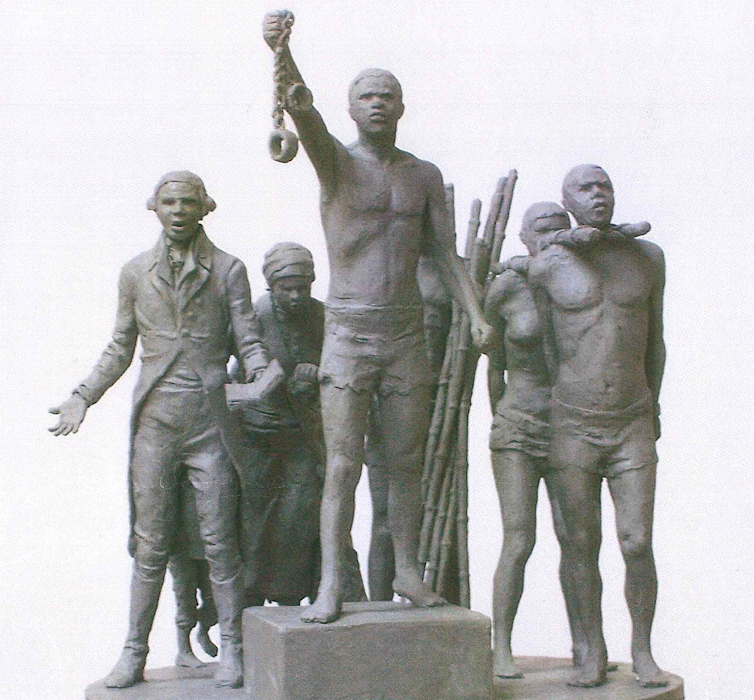
The sound of the water flowing from the fountain that now stands towering in Tate Modern’s Turbine Hall creates a calming softness in contrast to the cold, hard concrete floor on which I sit trying to take in the 13-metre-tall monument before me.
The sculpture is both calming and distressing: presenting painful histories of the black Atlantic slave trade in the “delightful family-friendly setting” of a public art museum. The characters of Venus, The Captain and Queen Vicky stand or sit around the monument’s plinth. A mother directs her young son’s gaze up to the water gently pouring down from above them. She does not point to the trunk of a tree planted on the side of the monument where these characters do not rest. It is not so pretty, not so easy to delight in. It is a tree without life: no branches, no leaves, only ghostly bodies hanging from an empty noose.
Painted on the Turbine Hall wall, the text for Kara Walker’s sculpture, Fons Americanus, calls visitors to “Gasp Plaintively, Sigh Mournfully and Gaze Knowingly” at her recasting of the Victoria Memorial which stands outside Buckingham Palace. This monument featured in my own undergraduate dissertation. In that, I explored representations of black British women’s history in London’s urban landscape by walking the city.
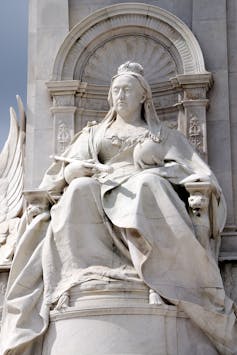
The only representations I found around the city placed imaginary women of “Africa” at the base of columns which celebrated Britain’s empire. I don’t think I particularly noticed then the absence of references to the slave trade. I focused on bringing to light the presence of the black Victorians who were nowhere to be found in the memorial fabric of the city in which I walked and this has remained the focus my research ever since.
Tate curator, Clara Kim, hopes that the work will stimulate a debate around the representation of difficult British histories in the urban landscape. It is a conversation that is sorely needed, but has been called for for some time.
In 1807, the Act for the Abolition of the British Trade in Slaves from any part of the coast or countries of Africa was enacted. As the bicentenary approached in 2007, discussions about how this bicentenary would and should be commemorated – rather than celebrated – heightened.
Memorial 2007 launched a campaign to memorialise not the white parliamentary abolitionists, but the Africans who were victims of and fought against the institutions of British slavery. The intention was for the sculpture, chosen by public competition, to be unveiled during the bicentenary year in 2007. Twelve years on, Walker’s intervention at Tate Modern is a stark reminder that no such memorial on a national scale has yet found a place in the capital.
Chaired by Oku Ekpenyon, Memorial 2007 has been campaigning since 2002 to raise funds to complete its mission, but that campaign is now nearly out of time. The group have secured planning permission for a space in the Rose Gardens in Hyde Park, but this expires in less than a month, on November 7, 2019.
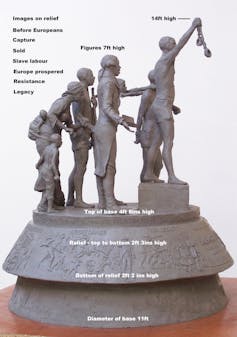
Every prime minister since the group formed has been asked to support the memorial, but no funds have been forthcoming. Although Boris Johnson, then Mayor of London, hosted an unveiling of a statuette of the memorial sculpture at City Hall, letters to Number 10 since he became prime minister have been met with silence. A petition to ask the government to fund the memorial before the deadline has been gaining momentum.
The state’s failure to acknowledge the pain and suffering of the victims of the British transatlantic slave trade through memorialisation is reflective of its failure to acknowledge the legacies of enslavement in contemporary Britain; its legacies of financial and social capital for those who benefited from it and the ongoing marginalisation of the descendants of those who were enslaved, as the recent Windrush Scandal painfully exposed. For Ekpenyon, the campaign to bring a memorial into being has been an exhausting 17 years of frustration, disappointment, anger and sadness.
Read more: Black history is still largely ignored, 70 years after Empire Windrush reached Britain
When I visited Tate’s Turbine Hall, visitors were walking around Walker’s fountain, craning their necks skyward to its peak, angling to get as much as possible of it in frame for a picture. I stood alone looking into the stricken face that appears from the sculptured folds of the Shell Grotto at the hall’s entrance. Here, the flowing water is a silent, steady stream of tears.![]()
Caroline Bressey, Reader in Historical Geography, UCL
This article is republished from The Conversation under a Creative Commons license. Read the original article.
The UK doesn't spend enough on the mental health of young people – we found out why
Thursday, 10 October 2019 06:42 Written by theconversation 
Stephen Rocks, University of Oxford and Apostolos Tsiachristas, University of Oxford
In 2016 the then health secretary, Jeremy Hunt, declared child mental health services the “biggest single area of weakness” in the NHS. He might have added that it is also vastly underfunded. The mental health of children and young people accounts for less than 1% of all NHS spending.
That is despite the significant burden that mental health problems impose on individuals, their families and society; despite one in eight young people having a mental health disorder; despite rising rates of self-harm and the fact that suicide is the leading cause of death among young men; and despite problems being serious enough to prompt the UK government to introduce a minister for suicide prevention in 2018.
Effective treatments exist, such as cognitive behavioural therapy and family therapy, and the sooner treatment is started, the more effective it is likely to be. Yet most young people don’t get help.
Read more: New ways to treat depression in teenagers
In England, two in three young people with a mental health problem do not receive support from specialist services. There are long waits for child and adolescent mental health services (CAMHS) and thresholds for entering care are high.
There is a clear disparity between the needs of young people and the resources dedicated to their mental health. Indeed, CAMHS accounts for around 7% of the NHS mental health budget even though children under 18 account for 21% of the population.
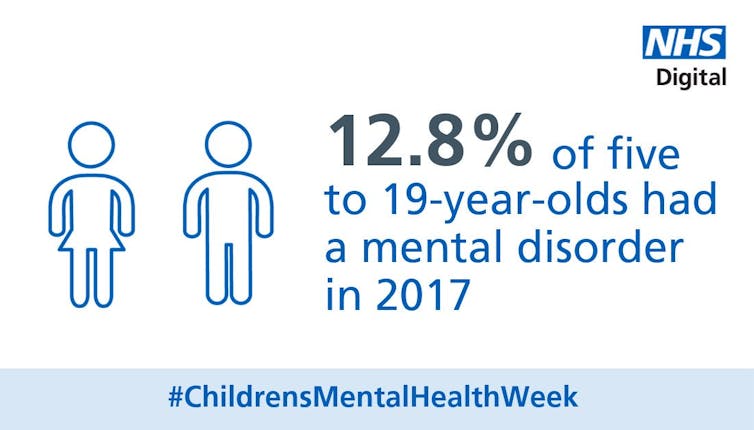
Why child mental health loses out
England has a decentralised system for providing healthcare, which means local areas commission most of their own health services, such as emergency services, hospital care, rehabilitation and mental health. NHS England assigns a budget based on how much it estimates an area needs, but it is up to local organisations called “clinical commissioning groups” to decide how to spend it.
Clinical commissioning groups spend widely different amounts on CAMHS, even after differences in population are accounted for. Our latest research shows that differences in spending can be explained not only by variation in the needs of young people but also by spending decisions in other areas.
Simply put, there are trade-offs. The NHS, like many health systems across the world, is under pressure. To increase spending on one area (CAMHS, for example) commissioners must decrease spending in another. That might result in someone waiting longer for surgery or to be seen at A&E. These are difficult decisions.
But CAMHS has been called the “Cinderella of the Cinderella” services, with many convinced that it is consistently overlooked. We think there are several reasons why child mental health may lose out to physical health when commissioners take spending decisions.
Rule of rescue. Spending decisions may be biased towards the “rule of rescue”, which predicts that spending will go towards immediate, life-threatening cases and away from prevention or early intervention – such as resolving a mental health disorder at a young age.
Lack of data. NHS targets have traditionally focused on things like A&E waiting times. With little data and, until recently, no targets for CAMHS nationally, commissioners have had less of an incentive to invest in these services.
Stigma. A lower level of awareness or stigma around mental health may have contributed to lower prioritisation of CAMHS in the past, and today’s decisions are constrained by the previous pattern of spending.
New technologies. Patients, doctors, private companies and even researchers may all have reasons to want new technologies to be adopted in healthcare. The lobbying for and adoption of new technologies may favour innovations, such as surgical instruments and drugs, over treatments that are labour intensive, such as talking therapy.
Read more: Key to lifelong good mental health – learn resilience in childhood
More, please
Things are improving. NHS England has started to collect new data, introduced a target to increase the number of young people receiving help and allocated extra funding to help local CAMHS transform (we are also trying to understand how much of a difference the transformation of local services makes). But a target of 35% of people in need receiving support is alarmingly low and many young people are still waiting too long for help.
Meanwhile, austerity in the UK is known to have hit children and lone parents particularly hard. Many services previously available to young people, such as children’s centres, have been cut following substantial reductions in local government budgets. This is expected to result in more young people needing support from specialist services.
The chance to intervene early is fleeting. Doing so requires a sea change in funding for young people both from within the NHS and other budgets.![]()
Stephen Rocks, Researcher, Health Economics, University of Oxford and Apostolos Tsiachristas, Senior Researcher, Health Economics, University of Oxford
This article is republished from The Conversation under a Creative Commons license. Read the original article.
Real Reason Jonathan Prevented Us From Rescuing Chibok girls —Ex-UK Prime Minister
Saturday, 05 October 2019 23:32 Written by newsvilReal Reason Jonathan Prevented Us From Rescuing Chibok girls —Ex-UK Prime Minister
A former Prime Minister of the United Kingdom, David Cameron, says former President Goodluck Jonathan was “sleeping on the wheel” while terrorists were busy abducting schoolgirls in Chibok, Borno State.
Cameron further stated that Jonathan prevented British forces from engaging in rescue efforts as he seemed to see the entire incident as cheap politics.
The former UK leader’s claim comes two years after the Observer newspaper reported that Nigeria shunned international offers to rescue the girls. While Nigeria welcomed an aid package and assistance from the US, the UK and France in looking for the girls, it viewed any action to be taken against kidnapping as a “national issue.”
In his recently published memoir, ‘For the Record’, Cameron, who was in office at the time of the abduction, said British troops traced the location of some of the victims and offered to help but Jonathan refused, The Cable reports.
Cameron wrote, “In early 2014 a group of its fighters entered the government secondary school in the village of Chibok, seizing 276 teenage girls. They were taken to camps deep in the forest. The Christians among them were forced to convert to Islam. Many were sold as slaves, entering the same endless violent nightmare the Yazidi women suffered.
“As ‘Bring Back Our Girls’ campaign spread across the world, we embedded a team of military and intelligence experts in Nigeria, and sent spy planes and tornadoes with thermal imaging to search for the missing girls. And, amazingly, from the skies above a forest three times the size of Wales, we managed to locate some of them.”
Cameron said he expected Jonathan to handle the Chibok issue better
“But Nigeria’s President, Goodluck Jonathan, seemed to be asleep at the wheel. When he eventually made a statement, it was to accuse the campaigners of politicising the tragedy. And absolutely crucially, when we offered to help rescue the girls we had located, he refused.”
Jonathan’s spokesman, Ikechukwu Eze, could not be reached for comment on Saturday.
However, the former President had said in an interview on BBC last year said that he could not be held responsible for the abduction of the Chibok girls.
Jonathan said rather, Boko Haram should be blamed for the abduction of the girls in 2014 because as a President he could not go to the battlefield to fight insurgents.
He said, “I cannot take responsibility for the abduction, I don’t control Boko Haram. They are criminals. But as a President, of course you know it is not the President that goes to the field. You have security and intelligence officers that do the work.
“Let me admit that yes, maybe they did their best but their best was not good enough for us to recover the girls. That I cannot say I am right or I am wrong. That does not mean I am trying to remove myself from any blame.
“I may not be blamed for the action but I could be blamed that my security intelligence system was not strong enough to rescue the girls. If I as a politician could tell the whole world that my political ambition for any office is not worth the blood of a single Nigerian, how would I be happy that girls have been kidnapped? I am not that kind of character.”
The former President also lamented the way the Chibok issue was politicised.
He wondered why a First Lady of the United States would take part in carrying a ‘Bring Back Our Girls’ placard
Nigerian woman who cheated UK system faces deportation
Saturday, 24 August 2019 07:24 Written by pmnews
Maria Adesanya: faces deportation from UK
Maria Adesanya, a Nigerian immigrant and mother of a five year-old child faces deportation from the UK after she was found guilty of bribing a male NHS nurse to pose as her baby daughter’s father so that her child could get British passport.
Adesanya, 31, paid £3,000 to UK citizen and Nigerian-born Adekunle Adeparusi, 44, to put his name down as the father on the child’s birth certificate.
Adeparusi then pocketed a further £13,000 that he claimed in child tax credits even though he had no role in the daughter’s life.
The pair hatched the plan in January 2014, three months after pregnant Adesanya entered the UK on an eight-month visitors VISA. They were only caught in February 2015 after the mother applied for a Derivative Authority Card.
During this time the mother found work using the ID cards of two EU nationals, a Portuguese and a Dutch citizen.
The child, now aged five, is thought to still be living in the UK.
At Minshull Street Crown Court, Manchester, Adesanya, from Bury, was sentenced to 14 months in jail but immediately released on licence as she had been under curfew since October.
She was found guilty of false representation and possessing false ID documents.
Adeparusi, from Gavesend in Kent, was jailed for 33 months after admitting making a false statement with intent.
Sentencing Adesanya, Judge John Edwards said: ‘This really was a performance of incredible stupidity by you.
‘You have a child out of wedlock which is frowned on by your culture and feared what would happen to you and your child if you returned to Nigeria.
‘The effect to them of their mother serving a period in prison would be shattering.
‘You have spent 10 months worrying about your future and your children’s future. Being separated from the children would have a significant detrimental effect on their emotional wellbeing.
‘But you displayed a blatant disregard for the immigration laws in this country. What you did was disgraceful and dishonest.’
When sentencing Adeparusi, the judge said: ‘Organised immigration crime such as that which you engaged in can have and does have a significant impact on public funds and confidence, and the abuse of documents and the lawful exercise of the right to enter this country goes to the heart of the system which all of us rely on.
‘When you came to this country in March 2007 and settled down with your family in Kent, qualifying as a nurse, I’m satisfied you intended to lead a constructive and contributing life.
‘But that all ended when you met Ms Adesanya. You lied face to face to the registrar and the passport office and it didn’t end there.
‘This was a highly devised and lucrative scheme, these are charges which completely undermine the integrity of the immigration system and garnered you a significant amount of money.’
Read More in Daily Mail
Popular News
How UK Police Arrested 'Yoruba Supremacist', Over Attacks On Igbo, Fulani
Sunday, 11 August 2019 14:05 Written by THECABLE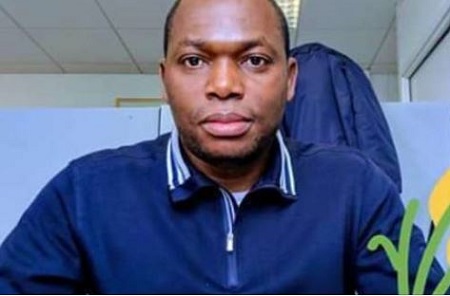
Grandson, a UK-based Nigerian of Yoruba descent, is known for his social media attacks on people of Igbo extraction as well as criticism of the Hausa-Fulani.
On Tuesday, the Scotland Yard Counter Terrorism Command arrested Grandson for allegedly “stirring racial discrimination” against the Igbo and Fulani ethnic groups and also “encouraging terrorism”.
After being grilled for nine hours, Grandson denied any involvement in terrorism or encouraging racial hatred and said YYF only supports the return of Nigeria to the regional system.
He was granted bail on the evening of his arrest while his passport, two Google phones, one Apple MacBook laptop computer, one tablet, a hard drive, and a draft copy of his new book were seized.
Among the conditions for his bail include are: he must sleep and live at his home address only and can’t access, use, or post on Facebook, Youtube, Tumblr, or the website linked to the YYF.
He was asked to return to the police on September 2 for further investigation.
In a statement, Tinuola Asake, YYF director of communications, said Grandson resigned from his job due to the seriousness of the allegations against him and is prepared to face legal battle if the need arises.
“Adeyinka Grandson has not been charged for any crime. He is required to report back to the police station on the second of September 2019. The Young Yorubas Forum has no idea what the police plan to do with the allegations of terrorism and public order acts,” the statement read.
He was reported to have recently called for secession with respect to the Yoruba race and threatened the north with the use of chemical weapons if the south-west is attacked under any guise.
The YYF, which Grandson heads, is a youth organisation established to “appeal to the consciousness of young Yorubas and support a return to the regional system of government or outright dissolution of Nigeria in favour of the Oduduwa Republic.”
Here’s Adeyinka Grandson Arrested in London for instigating killing of Igbos
Saturday, 10 August 2019 10:01 Written by expressiveinfo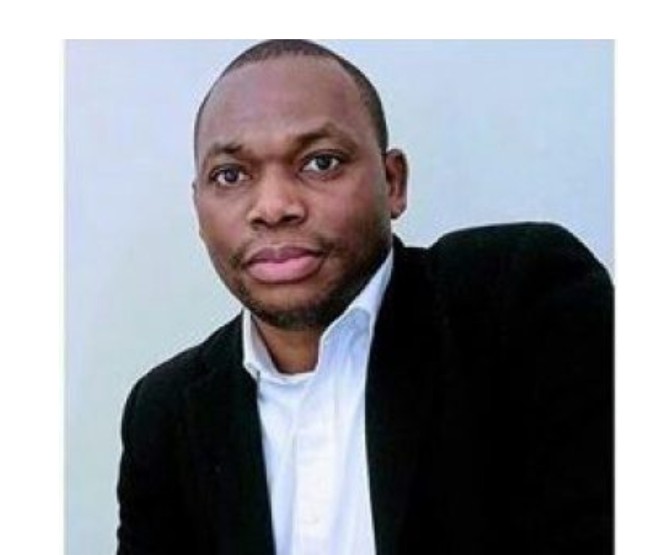
Sins of the past helped find Adeyinka Grandson who has been vocal in instigating violence against the Igbos.
Grandson who is the convener of Young Oduduwa Leaders (YOL) was arrested in London at 5:35am on Tuesday by the Scotland Yard Counter Terrorism Command for the offenses related to Terrorism and Public Order Acts.
Grandson called for the killing of Igbos residing in Yoruba land for not voting the candidate of their choice” during the March 2019 General Election.
Adeyinka Grandson’s arrest was based on his controversial YouTube videos, Facebook & Tumblr posts and a website linked with the name of the YYF, but does not belong to the YYF, the Yoruba man specializes in calling for the killings of Igbos who are based in Yoruba land.
Adeyinka was accused of instigating racial discrimination against the Igbo people and for encouraging terrorism all which he denied. He was granted conditional bail at 9:15 pm on the 6th August 2019.
See one of the post he shared:

As part of his bail conditions, he cannot access, use, or post on Facebook, YouTube, Tumblr or the website linked with the Young Yoruba for Freedom, which of course does not belong to the YYF. He was directed to report back to the Police station on the 2nd September 2019.
You can also watch one his videos via the link below
Nigerian Man Jailed 17 Years In UK For Killing Midwifery Student
Wednesday, 07 August 2019 02:52 Written by oasesnews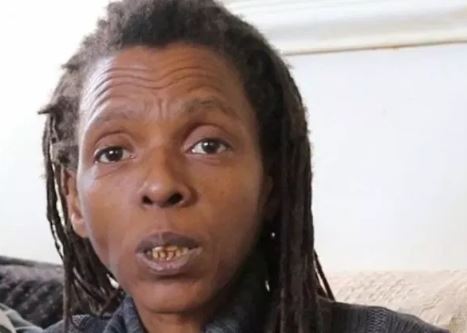
Shohfah-El Israel was convicted by a jury at Reading Crown Court on Monday of killing Ms Morgan after spending time alone with her – against strict church rules – in December.
The 20-year-old’s body has never been recovered, despite extensive police searches of hundreds of acres of land in Hertfordshire, Kilburn Times reported
Passing sentence this afternoon Judge Michael Soole said: “Only you know the circumstances of your terrible deed and why you did it.
“You are evidently an intelligent man and have said nothing beyond the lies and the explanations which the jury has rejected.
“The court has heard the most moving personal statement from Joy’s mother Carol Morgan, which speaks of Joy’s warm, loving and caring personality and character.
“On top of all this must be the very particular and continuing distress and suffering which flows from your cruel and cowardly silence about Joy Morgan’s final resting place.
“I am only too conscious that no sentence of the Court can palliate the loss and grief for Mrs Morgan and the wider family.”
The court heard Israel lied to the police when he was arrested, saying he had dropped Ms Morgan off at her student accommodation in Hatfield after a celebratory dinner at the American-founded Israel United in Christ Church they attended in Ilford, east London, on December 26.
He later admitted he had in fact spent two nights alone with the University of Hertfordshire student in his Cricklewood flat, but claimed his lies were due to concerns about having broken church rules banning women from being alone with men other than their husbands.
After killing Ms Morgan, he attempted to cover his tracks by removing her number from a church Telegram group chat, the court heard, and even kept up the pretence by going to her student house share under the guise of checking on her in the days after she apparently went missing.
A signal from Ms Morgan’s phone, which has never been found, was detected in Israel’s car in the Stevenage area on December 28, at which point the jury was told he was most likely “looking for somewhere to dispose of the body”
UK jails 3 Nigerians for laundering £1m to Black Axe leader in Nigeria
Monday, 05 August 2019 05:17 Written by pmnewsThree Nigerian siblings who were working directly for the leader of the Nigerian Black Axe gang, Augustus Bemigho-Eyeoyibo, have been jailed for a total of 16 years after laundering nearly £1m to him in Nigeria through UK bank accounts.
Crown Prosecution Service reported on its website that Okemiorukaye Nakpodia, 56, was found guilty of conspiracy to money launder at Woolwich Crown Court on 8 May. Esther Nakpodia, 35, Unuakpotovo Nakpodia, 46, both pleaded guilty at an earlier hearing.
They laundered the proceeds of hundreds of frauds between 2007 and 2015.
Police identified 174 suspicious transactions entering bank accounts. Money from a number of the victims of the original frauds ended up in the defendants’ bank accounts and was then laundered by the Nakpodias.

Augustus Bemigho-Eyeoyibo, leader of Black Axe, recipient of the money
Augustus Bemigho-Eyeoyibo, is the brother-in-law of the three defendants. Black Axe is a banned organisation in Nigeria and has been linked to decades of murders, rapes, extortion and drug dealing in Nigeria and across the world, with members allegedly swearing a ‘blood oath’ to join.
Philip Slough, for the CPS, said: “We were able to show the Nakpodias were talking to Augustus Bemigho-Eyeoyibo, the leader of Black Axe, based on conversations found on their devices. They talked about the amounts, and what to do with the funds after they arrived, including how much to keep for themselves.
“This strong evidence confirmed that the Nakpodias had been actively involved for a number of years in a conspiracy to launder money which had been stolen by others using phone and email scams.
“This prosecution will play a role in starving a dangerous criminal gang of funds and we will seek to recover their proceeds of crime at a later hearing.”
Today at Woolwich Crown Court Unuakpotovo Nakpodia has been jailed for seven years and seven months, Okemiorukaye Nakpodia has been jailed for six years and six months, while Esther Nakpodia has been sentenced to two years and six months in prison.
Building the case
Philip Slough, for the CPS, said: “Esther Nakpodia claimed to have never heard of Black Axe, denying links to the organisation – this despite the fact her sister has been married to the group’s leader for 14 years.
“She denied knowing that Augustus Bemigho-Eyeoyibo is involved in gang activity, and said she believed he was a reputable business man. She accepted being in possession of £28,000 when arrested – this was money withdrawn from her bank account and was taking it with her to Nigeria to give to her sister and brother-in-law in person. A number of incriminating text messages were found on her mobile phone seized from her upon arrest, revealing her deep involvement in the laundering of these funds.
“Unuakpotovo Nakpodia admitted opening and controlling numerous bank accounts – between January 2007 and February 2015, she received over £700,000 of suspicious payments from between 65 and 70 unconnected parties in 16 different countries. Unuakpotovo also denied being part of a conspiracy to money launder the proceeds of crime.
“Okemiorukaye Nakpodia accepted all transactions relating to the bank accounts attributed to him – he received nearly £50,000 of direct suspicious payments from eight unconnected third parties in three different countries. He claimed not know the source of these transfers.”





